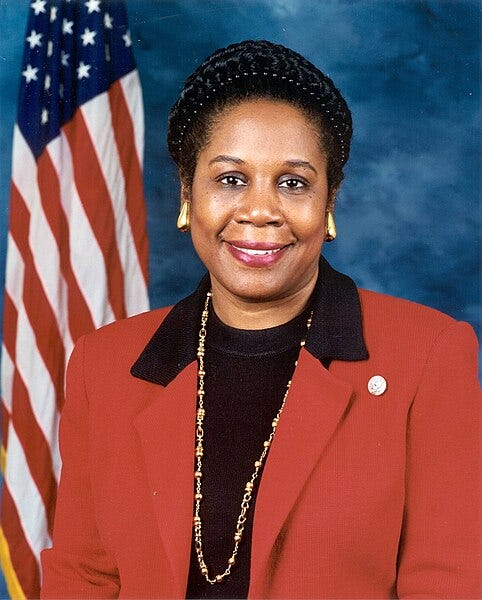Corporate Decay, Gina Raimondo, and the Media's Coverage of the 2024 Elections:
Hopefully The Media Won't Cover Donald Trump The Same Way They've Covered Gina Raimondo.
Feel free to check the entire blog archives from “Political Pulse” & “Salzillo Report” on the 2024 primary cycle, rural outreach, redistricting litigation, base dynamics, campaign organization, the current media landscape, the issues at stake, Project 2025, Build Back Better, the progressive movement, the true story about Gina Raimondo, and much more.
Stand by for later this week with my upcoming take on President Joe Biden’s withdrawal from the 2024 presidential race and what it means for this election cycle.

Yes, it is sad to say. But as I can attest to from personal experience and my conversations with a number of people in the community over the years, a corporate press is not always independent or free.
The decline of the media—national & local—is something I have covered before. As readers of this blog know, it has been a years-long—and even decades-long—development. But the corporate media has reached another new low in this election cycle.
For example, you may remember the story on Commerce Secretary Gina Raimondo’s 60 Minutes puff piece. It was almost entirely one-sided, with a clear bias and agenda. Mainly, it clearly sought to prop up Secretary Raimondo’s ambitions for higher office in the near future. Which potentially explains why Raimondo occasionally showed up in open Chicago convention talk, and even as a speculated VP candidate.
Here’s what that segment didn’t tell you. Two years before the earliest indications of the segment being filmed in Rhode Island, I reached out to 60 Minutes on looking into Gina Raimondo’s track record in Rhode Island. I voiced the concerns that many people had at the time—and still have—about her role in the Biden Cabinet. My tip ultimately was cast aside. However, it was not ignored by the hardworking staff at 60 Minutes, from correspondents to producers, who all privately indicated their interest in my tip. Many of those individuals followed up and tried to work to get the story out there. Unfortunately, someone higher-up clearly ran interference to stop a more critical piece from coming out. As a result, we got the Raimondo for America infomercial we all saw back in April, likely at the behest of executive management.
Quite a twist to those unfamiliar with the story, huh (and why I published “The Gina Raimondo Files” at that time)?
This also happened with SEC pension whistleblower Ted Siedle, who was fired as an unpaid contributor to Forbes magazine (emphasis mine) in 2021 when Raimondo was being floated as a Cabinet member in almost all the Beltway circles. Because of longtime pressure from Raimondo’s press people to the magazine’s most prominent executives, Forbes fired Siedle as to not antagonize the business world that was so receptive to Raimondo’s rise from local to national politics.
Just one more story for you: Boston Globe Rhode Island’s Rhode Map newsletter, authored by columnist and former WPRI 12 reporter Dan McGowan, came out in 2019 with Raimondo’s Commerce Corporation as one of its first advertisers and sponsors. Imagine that a state government agency can actually sponsor a newsletter. Can you say conflict of interest? In the years since, talk of Raimondo’s growing political stature and presidential speculation has become pervasive in many of its columns. Get the picture now?
Most national and local press outlets can definitively attest to the existence of Raimondo critics who have volunteered to offer insight of their own, and comment publicly if granted the opportunity for at least 3 years. That did not happen. Was it because the rank-and-file staff didn’t do their job? Absolutely not. I can personally attest to that. You know what happened though? The media executives and corporate management were so much more interested in ratings, power, and their bottom line over “burning bridges” and harming their self-interest.
Gina Raimondo is the living testament of all of the above. Corporate America & Wall Street love Raimondo. She is one of the most prolific fundraisers out there in the entire country. And her self-construed narrative is one that gets a lot of attention, however undeserving it is. That is why you only get one side of the story by and large in the public domain.
You know who else fits the profile? Donald Trump.
Several well-respected people in the media world have raised huge fire alarms about the media’s differing coverage of Donald Trump compared to Joe Biden. Jennifer Rubin of The Washington Post said it bluntly. So did Waleed Salem in a similarly direct manner. And it has not gone unnoticed from media watchdogs like Media Matters for America.
If you saw the way the media treated the Republican National Convention this past week, you wouldn’t have thought the press was reporting on it. You would have thought they were promoting the event and each and every one of its reality TV-style developments. They clearly considered it an opportunity to bring out their sensationalist typical talking head-style commentary that they have “perfected” over the years and decades.
The 2024 RNC was being compared to the 2008 DNC. JD Vance was being compared to other national trailblazers because of the significance of his facial hair. Of all things to care about, really? Really? Yes, if you watched CNN and other channels, they would have also given the impression that Trump had an epiphany and was going to be the national unifier of the day. So much for that.
Look in 2016 too. Hillary Clinton was the darling of the media world, running against the threat to the corporate bottom line in Bernie Sanders. The corporate media clearly had its preferred candidate in Hillary Clinton, with an overrepresentation of Clinton supporters and direct involvement in assisting her campaign. We know this via WikiLeaks, most notably from CNN commentator Donna Brazile’s decision to hand the Clinton campaign debate questions in advance during the New York Presidential Primary. Not only did Clinton get positive coverage and even assistance in the press world, but the media incessantly attacked Sanders. This isn’t an opinion. It is something backed up by independent observers and media experts themselves in both 2016 and 2020 (the same pattern shaped Elizabeth Warren’s run as a presidential candidate). In 2020, the media resorted to unsubstantiated ad-hominem attacks against the Sanders campaign, including calling Sanders a “Communist,” and comparing him and his supporters to Nazis (particularly insensitive because many in Sanders’s family died in concentration camps).
More recently, we have seen the corporate media obsess about Biden’s age. Look, I have no qualms in asking tough questions to the President about his age & fitness considering the debate performance. Nor do I object to questions on his record, his vision, or on any other issue. People like to hear tough questions. They like to see the media do its job.
That also means Trump should not get a free pass on his record, his vision, and his age especially. Trump is only 3 years younger than Biden, and people have no clue about his overall physical health. Unless you rely on Dr. “Ronny Johnson” (oops, Jackson), who left the White House awash in speed and Xanax. Maybe this is why Trump is up at 4 AM all night tweeting. Mentally, he checks all the boxes for a diagnosis of narcissistic personality disorder (see Mary Trump and DSM Manual, fifth edition), and his symptoms of cognitive decline are evident at his campaign events (see this lengthy montage of clips at rallies).
It can only get worse. He would be 82 four years from now. Why don’t people ask questions about his health and fitness for office? It’s not ageist at all. It is good journalism. But it also doesn’t happen. When have you seen Trump asked tough questions about age & fitness? Compared to the endless amount of scrutiny Biden received, however legitimate it really was? That is the problem.
Even on the issues. Ever hear a candid conversation on a regular basis about inequality in America or communities that have felt abandoned and taken for granted over the years and decades? Not really, but you will hear plenty of headlines about the stock market—especially on places like CNBC, Yahoo, & Bloomberg.
For now, I won’t even get to the executives of Fox Propaganda “News”, since they had to pay Dominion a $787 million settlement for their election lies, and are in the middle of another libel lawsuit, likely to be even more expensive with Smartmatic. They have essentially admitted that they promoted election lies to keep their loyal fan base intact.
But forget the Fox Propaganda News Machine. They are beyond hope. Why isn’t the rest of the media doing better?
How about we hear a possibly reason why? From David Zaslav, the CEO of Warner Media, the company that runs CNN. Here is his Election 2024 priority:
Hear that everyone? Not democracy, not Project 2025, not even abortion, the economy, crime, or immigration. In the world of Zaslav, entertainment industry deregulation and consolidation is the number one issue. The downslide, or even potential death, of the American Experiment is nowhere near as important to this CNN executive as making sure the next President positively impacts his bottom line and his dear TV ratings. Effectively an endorsement of Donald Trump on that end.
But this is not new either. Remember CBS News’s Leslie Moonves (yes, the sexual predator Leslie Moonves)? He said in 2016 Trump may be bad for America, but he’s damn good for business way back when. This is what we get with our media being run like a private enterprise.
Know what else management in places like CNN, CBS, Sinclair, Nexstar, and Gannett also have in common? They cut local investigative reporting and shrink their own newsrooms. They fire their own reporters for more revenue. So either these reporters have to find another job at another station with relatively low pay, or they do what people like Catherine Herridge have to do, which is work independently without any middlemen in their way. And it makes sense, doesn’t it?
We shouldn’t disregard the best of journalism out there because there are many of those stories, and we should not ignore them. Yet we also need to acknowledge the problem—that private interests have corroded what had been a free and independent press.
Hard to imagine what Walter Cronkite, Ted Koppel, or Tim Russert would think of this type of media environment today. I say it’s a travesty. “And that’s the way it is.”




